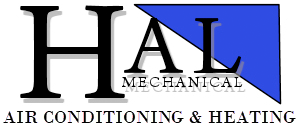The heating, ventilation, and air conditioning (HVAC) system ensures you have a cool and comfortable home throughout the hot summer season. There are many components of an HVAC system. One critical but often overlooked component of your HVAC system is the capacitor. The capacitors act like a battery and stores the energy that is needed for the motor and compressor in your air conditioner or furnace. A failing capacitor can lead to issues with your HVAC system. Hal Mechanical would like to share some of the early signs of a failing capacitor to save you time, money, and ensure you stay comfortable all year round.
What Does the HVAC Capacitor Do?
A capacitor is an essential component of your HVAC system. It supplies and stores energy that is used to start up and run the motors that power the fans and the compressor. There are two types of capacitors found in most HVAC systems. There is the start capacitor, which provides the initial boost to start the motor, and the run capacitor, which maintains a steady flow of electricity to keep the motor running. If the capacitors wear down or fail, they will not be able to start up the fan motor or compressor which is essential in the cooling process.
How Do I Know if My HVAC Capacitor is Bad?
Difficulty in Starting – One of the most common signs of a bad capacitor is when your HVAC system has a hard time starting up. You might hear a humming sound as it attempts to start but cannot quite get the job done. This happens because the capacitor is unable to provide the necessary jolt of electricity to start the motor.
Inconsistent Temperature – Another sign of a bad capacitor is unstable cooling. If the capacitor is malfunctioning or failing, it may not be supplying the necessary energy to keep the motor and compressor running efficiently. As a result, the air that is circulated may not be as cold as it should be.
High Energy Bills – If your energy bills are suddenly much higher without any change in your usage or energy rates, a failing capacitor could be the reason. As the capacitor struggles, the system will draw more power in an attempt to maintain a comfortable home, leading to higher energy consumption.
Swollen or Leaky Capacitor – There are physical signs can also indicate a failing capacitor. If the capacitor is swollen or leaky, it’s likely going bad. Typically, capacitors are flat and cylindrical. If it appears swollen or bulged, or if there’s oil around it, it’s time to replace the capacitor.
Age and Lifespan – Most capacitors have a life span of about 10 to 20 years, although this can be shortened by factors such as excessive heat exposure, voltage fluctuations, and frequent on-off cycles. If your HVAC system is within this age range and experiencing issues, it might be the capacitor.
Why is Regular HVAC Maintenance Important?
Regular HVAC system maintenance can help you identify issues like a failing capacitor before they become a major problem. An HVAC professional can check the system’s components, including the capacitors, during regular maintenance or tune-ups. This can prevent unexpected breakdowns and keep your system running efficiently. A failing capacitor can have a major impact on the efficiency and functionality of your HVAC system. By seeing the signs of a failing capacitor, you can address the problem early and keep your system running smoothly.
Air Conditioning Services & More in Aliante, Centennial, Desert Shores, Eldorado, Enterprise, Green Valley Ranch, Henderson, Lone Mountain Village, North LV, Peccole Ranch, Paradise, Silverado Ranch, Spring Valley, Summerlin, Sunrise Manor, Tuscany Village, Whitney, Winchester & Las Vegas Nevada
If you notice signs of failing capacitors or need HVAC services, contact Hal Mechanical and schedule our services today.






